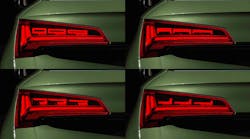The US Department of Energy (DOE) has announced a new round of funding for solid-state-lighting (SSL) core technology research ($4.3 million), product development ($3.6 million), and manufacturing ($6.9 million) projects. Announced by US Energy Secretary Steven Chu, the latest LED- and OLED-R&D funding round will distribute $14.8 across eight projects, and those funds will be augmented with an additional $4 million in funds from the private sector.
The DOE has a vested interest in LED and OLED lighting technology both to reduce energy consumption and to spur economic growth in the US by helping build a domestic SSL technology base. The new funding represents the 7th round of funding for core SSL R&D and product development, and the 2nd round of funding for manufacturing projects.
”These next-generation lighting technologies have the potential to transform the way we light our homes and businesses and generate enormous energy and cost savings for families and businesses across the country,” said Chu. “These investments in cutting-edge lighting technologies will support American innovation, create new manufacturing jobs for U.S. workers, and help ensure that the United States leads the world in this rapidly evolving industry.”
Core SSL technology
Arizona State University ($664,785), Research Triangle Institute ($1,699,318), Soraa Inc. ($678,257), and the University of Rochester ($1,247,881) received funds in the core technology research area. In general, core research is focused on solving problems in LED and OLED technology that is gating widespread deployment of the lighting technologies in general illumination applications.
The two universities will both focus on OLED research. Rochester will investigate the use of an internal scattering layer to improve light extraction. Arizona State is researching a single-emitter approach to white OLEDs that could reduce costs.
Soraa will seek to improve packaged LED efficacy by developing devices that can operate at higher current levels. The Research Triangle Institute will research methodologies for predicting the reliability and lifetime of LED-based luminaires.
SSL product development
The product development funds were split between LED-lighting stalwarts Cree ($1,610,681) and Philips Lumileds ($1,987,200). Product-development projects focus on lowering the cost and ramping performance in SSL materials, devices, and systems.
Philips will focus on high-voltage, low-current LEDs that can simplify driver designs. Cree plans to focus on design tradeoffs in packaging and fabrication that increase device efficacy.
SSL manufacturing projects
Moser Baer Technologies ($2,906,324) and Veeco Instruments ($4,000,000) will receive funding for SSL manufacturing projects. The manufacturing awards are targeted at achieving the manufacturing cost reductions needed to make LED and OLED lighting cost competitive with other light sources.
The manufacturing awards include both an LED and an OLED project. Veeco will explore the use of an aluminum-nitride (AIN) buffer layer that could enable LED manufacturing on silicon substrates. Silicon wafers would in turn reduce costs and simplify the manufacturing process.
Moser Baer, meanwhile will continue to work on its pilot OLED manufacturing line in Canandaigua, New York for which the company partners with Universal Display. The project is focused on processing techniques that can reduce cost.
Interested parties can find more information on the awards on the DOE Energy Efficiency & Renewable Energy website and from the DOE FY11 SSL Awards PDF.
The DOE is hosting SSL technology and manufacturing workshops on an annual basis to both provide an update on the state of the industry and funded projects, and to interactively work with industry participants in evolving its SSL R&D plan and selecting projects for funding. For example, the DOE held its SSL R&D workshop earlier this year in San Diego and we published a full report on the event.




